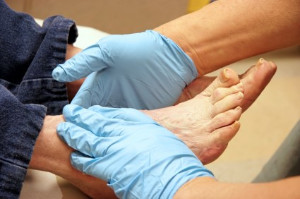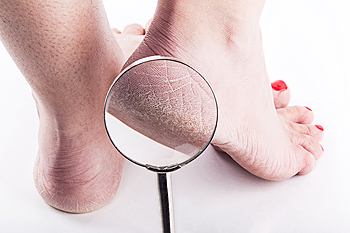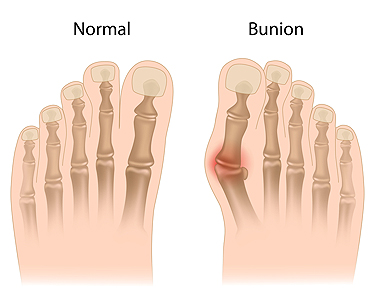Connect With Us
Blog
Items filtered by date: March 2023
Preventing Athlete’s Foot in Children

If you are caring for a growing child, helping them protect the health of their feet can be critical to ensuring their overall health and well-being. Athlete’s foot is one particular kind of threat to the health of a child’s feet and it is contagious. This condition is caused by a fungal infection, and some children can develop this affliction by walking around barefoot in spaces at daycare or school. Interestingly, boys are more likely to develop a case of athlete’s foot than girls. Before a child reaches the age of 4, it is unlikely that they will present a case of athlete’s foot. If you notice that your child is repeatedly itching in between their toes, then this may be an early indicator that your child could have athlete’s foot. If you suspect that your child might have athlete’s foot, it is highly suggested that you contact a podiatrist to treat your child before the infection spreads.
Making sure that your children maintain good foot health is very important as they grow. If you have any questions, contact one of our podiatrists of Southwest Podiatry. Our doctors can provide the care you need to keep you pain-free and on your feet.
Keeping Children's Feet Healthy
Having healthy feet during childhood can help prevent medical problems later in life, namely in the back and legs. As children grow, their feet require different types of care. Here are some things to consider...
Although babies do not walk yet, it is still very important to take care of their feet.
Avoid putting tight shoes or socks on his or her feet.
Allow the baby to stretch and kick his or her feet to feel comfortable.
As a toddler, kids are now on the move and begin to develop differently. At this age, toddlers are getting a feel for walking, so don’t be alarmed if your toddler is unsteady or ‘walks funny’.
As your child gets older, it is important to teach them how to take care of their feet.
Show them proper hygiene to prevent infections such as fungus.
Be watchful for any pain or injury.
Have all injuries checked by a doctor as soon as possible.
Comfortable, protective shoes should always be worn, especially at play.
If you have any questions please feel free to contact our offices located in Dallas, and Carrollton, TX . We offer the newest diagnostic and treatment technologies for all your foot and ankle needs.
Why Live with Pain and Numbness in Your Feet?
Diabetes and Yellow Nails

It is a well-documented fact that individuals living with diabetes are at an increased risk of experiencing certain foot conditions. If you are a diabetic, you might consider watching out for the development of toenails that turn a yellowish color. Luckily, this change in the hue of the toenails is not harmful, although it may be unsightly. The toenails can turn a yellow color for a number of different reasons when it is related to diabetes. Typically, a diabetic’s toenails might turn yellow due to the breakdown of sugar. Alternatively, toenails that have a yellow tint could be caused by a toenail infection. If you are someone that is living with diabetes, it is suggested that you consider contacting a podiatrist for more information. This foot specialist will be able to assist you with any foot complications you might be experiencing.
Diabetic foot care is important in preventing foot ailments such as ulcers. If you are suffering from diabetes or have any other concerns about your feet, contact one of our podiatrists from Southwest Podiatry. Our doctors can provide the care you need to keep you pain-free and on your feet.
Diabetic Foot Care
Diabetes affects millions of people every year. The condition can damage blood vessels in many parts of the body, especially the feet. Because of this, taking care of your feet is essential if you have diabetes, and having a podiatrist help monitor your foot health is highly recommended.
The Importance of Caring for Your Feet
- Routinely inspect your feet for bruises or sores.
- Wear socks that fit your feet comfortably.
- Wear comfortable shoes that provide adequate support.
Patients with diabetes should have their doctor monitor their blood levels, as blood sugar levels play such a huge role in diabetic care. Monitoring these levels on a regular basis is highly advised.
It is always best to inform your healthcare professional of any concerns you may have regarding your feet, especially for diabetic patients. Early treatment and routine foot examinations are keys to maintaining proper health, especially because severe complications can arise if proper treatment is not applied.
If you have any questions please feel free to contact our offices located in Dallas, and Carrollton, TX . We offer the newest diagnostic and treatment technologies for all your foot and ankle needs.
Cracked Heels in Men and Women

Cracked heels are a relatively common condition of the foot in which the heels become so severely dehydrated that the skin can essentially crack or form fissures. Fortunately, many different cases of cracked heels are relatively harmless and merely look unsightly. Many newcomers to the field of podiatry often wonder whether cracked heels affect women and men in different ways. The answer is somewhat complicated. Even though about 20% of all adults in the United States have developed cracked heels, women are about 50% more likely than men to report to their medical professional that they have cracked heels. So, therefore, the answer is not straightforward. Just because women are more likely to report cracked heels does not mean that they experience it more than men do. If you are someone that struggles with cracked heels, it is suggested that you contact a podiatrist for treatment or to answer any of your questions.
Cracked heels are unsightly and can cause further damage to your shoes and feet. If you have any concerns, contact one of our podiatrists from Southwest Podiatry. Our doctors can provide the care you need to keep you pain-free and on your feet.
Cracked Heels
Cracked heels appear unappealing and can make it harder for you walk around in sandals. Aside from looking unpleasant, cracked heels can also tear stockings, socks, and wear out your shoes. There are several methods to help restore a cracked heel and prevent further damage.
How Do You Get Them?
Dry skin is the number one culprit in creating cracked heels. Many athletes, walkers, joggers, and even swimmers suffer from cracked heels. Age and skin oil production play a role to getting cracked heels as well.
Promote Healing
Over the counter medicines can help, especially for those that need instant relief or who suffer from chronic dry feet.
Wear Socks – Wearing socks with medicated creams helps lock in moisture.
Moisturizers – Applying both day and night will help alleviate dryness which causes cracking.
Pumice Stones – These exfoliate and remove dead skin, which allows for smoother moisturizer application and better absorption into the skin.
Change in Diet
Eating healthy with a well-balanced diet will give the skin a fresh and radiant look. Your body responds to the kinds of food you ingest. Omega-3 fatty acids and zinc supplements can also revitalize skin tissue.
Most importantly, seek professional help if unsure how to proceed in treating cracked heels. A podiatrist will help you with any questions or information needed.
If you have any questions, please feel free to contact our offices located in Dallas, and Carrollton, TX . We offer the newest diagnostic and treatment technologies for all your foot care needs.
Juvenile Hallux Valgus

Bunions, or hallux valgus, is a surprisingly common ailment in the forefoot of children. A bunion is a bony growth that develops on the joint of the big toe and often causes this toe to lean towards the smaller toes. Having a bunion can cause pain and discomfort, particularly because the bunion rubs against shoes. Wearing wider shoes can provide mild relief, but sometimes surgery is the best option for treatment among those in this age group. This is typically successful in children because their growth plates are active, which helps with healing and readjustment of the toe joint. If your child has a bunion that is causing pain, it is suggested that you see a podiatrist for an examination and treatment options to consider.
If you are suffering from bunions, contact one of our podiatrists of Southwest Podiatry. Our doctors can provide the care you need to keep you pain-free and on your feet.
What Is a Bunion?
A bunion is formed of swollen tissue or an enlargement of boney growth, usually located at the base joint of the toe that connects to the foot. The swelling occurs due to the bones in the big toe shifting inward, which impacts the other toes of the foot. This causes the area around the base of the big toe to become inflamed and painful.
Why Do Bunions Form?
Genetics – Susceptibility to bunions are often hereditary
Stress on the feet – Poorly fitted and uncomfortable footwear that places stress on feet, such as heels, can worsen existing bunions
How Are Bunions Diagnosed?
Doctors often perform two tests – blood tests and x-rays – when trying to diagnose bunions, especially in the early stages of development. Blood tests help determine if the foot pain is being caused by something else, such as arthritis, while x-rays provide a clear picture of your bone structure to your doctor.
How Are Bunions Treated?
- Refrain from wearing heels or similar shoes that cause discomfort
- Select wider shoes that can provide more comfort and reduce pain
- Anti-inflammatory and pain management drugs
- Orthotics or foot inserts
- Surgery
If you have any questions, please feel free to contact our offices located in Dallas, and Carrollton, TX . We offer the newest diagnostic and treatment technologies for all your foot care needs.

